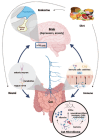Diet interventions for depression: Review and recommendations for practice
- PMID: 39628343
- PMCID: PMC11783990
- DOI: 10.1177/00048674241289010
Diet interventions for depression: Review and recommendations for practice
Abstract
Objective: this paper aims to present the evidence for the role of diet in the prevention and treatment of depression, review the potential underlying mechanisms and provide practice recommendations for mental health clinicians.
Methods: A literature review was conducted through searches of PubMed with the search terms 'depression', 'diet', 'prevention', 'treatment' and 'mechanisms' and combinations thereof. Additional articles were identified through hand searching.
Results: Greater adherence to several healthy dietary patterns, traditional diets such as the Mediterranean diet and other diets such as the DASH diet are associated with or can treat symptoms of depression. Several limitations of the research were noted, many of which relate to inherent challenges of studying diet. Mechanisms by which dietary intervention can influence mood include the gut microbiome, modulation of inflammatory processes, reduction in oxidative stress and modulation of hypothalamic-pituitary-adrenal axis function. Recommendations for mental health clinicians to enable translation of the evidence into practice are provided.
Conclusion: Diet can play an important role in preventing and treating depression. Mental health clinicians are well placed to provide dietary counselling and to use clinical judgement in choosing the specific approach that reflects the needs of the patient but are encouraged to refer to a specialist dietitian where necessary.
Keywords: DASH diet; Mediterranean diet; anti-inflammatory; depression.
Conflict of interest statement
Declaration of Conflicting InterestsThe author(s) declared the following potential conflicts of interest with respect to the research, authorship and/or publication of this article: H.M.S. has received research funding from DSM Pharmaceuticals, the Rome Foundation, VSL Pharmaceuticals; non-financial support from VSL Pharmaceuticals; and consulting fees from Dietitian Connection, Dietitians Australia and Microba. S.B.T. was a contractor to Nutrition Research Australia; and has received consulting fees from the British Dietetic Association, Dietitian Connection, Dietitians Australia, Education in Nutrition, the Royal Australian and New Zealand College of Psychiatrists (Tasmania Branch), the University of Newcastle, Australia and the University of Technology Sydney, Australia. C.C. and R.O. have no conflicts of interests to declare. F.N.J. has received competitive grant or research support from the Brain and Behaviour Research Institute, the NHMRC, Australian Rotary Health, the Geelong Medical Research Foundation, the Ian Potter Foundation, The University of Melbourne; industry support for research from Meat and Livestock Australia, Woolworths Limited, the A2 Milk Company, Be Fit Foods, Bega Cheese; philanthropic support from the Fernwood Foundation, Wilson Foundation, the JTM Foundation, the Serp Hills Foundation, the Roberts Family Foundation, the Waterloo Foundation; and travel support and speakers’ honoraria from Sanofi-Synthelabo, Janssen Cilag, Servier, Pfizer, Network Nutrition, Angelini Farmaceutica, Eli Lilly and Metagenics. F.N.J. has written two books for commercial publication. T.R. has received philanthropic support from the Fernwood Foundation, Wilson Foundation, and the Roberts Family Foundation; industry support from Be Fit Foods; and consultancy fee, speakers honoraria and travel support from Fondation Fondamental, Culinary Medicine UK, Field Doctor UK, and Next Media.
Figures
References
-
- Bayes J, Schloss J, Sibbritt D. (2022) The effect of a Mediterranean diet on the symptoms of depression in young males (the AMMEND: A Mediterranean Diet in MEN with Depression study): A randomized controlled trial. American Journal of Clinical Nutrition 116: 572–580. - PubMed
-
- Bot M, Brouwer IA, Roca M, et al.. (2019) Effect of multinutrient supplementation and food-related behavioral activation therapy on prevention of major depressive disorder among overweight or obese adults with subsyndromal depressive symptoms: The MooDFOOD randomized clinical trial. JAMA 321: 858–868. - PMC - PubMed
Publication types
MeSH terms
LinkOut - more resources
Full Text Sources
Medical



